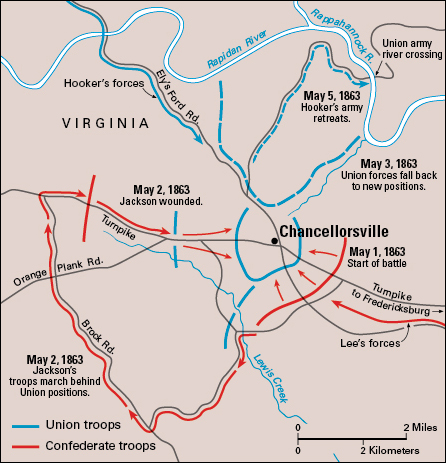Chancellorsville, Battle of, was an important battle of the American Civil War (1861-1865). The battle, named after a settlement on the battlefield, took place in northern Virginia from May 1 to May 4, 1863. Confederate forces led by General Robert E. Lee defeated a much larger Union army under General Joseph Hooker. Many historians consider Chancellorsville to be Lee’s greatest victory. However, during the battle, Thomas “Stonewall” Jackson, one of the South’s best generals, was mortally wounded.

In December 1862, Confederate forces under Lee defeated Union forces under General Ambrose E. Burnside at Fredericksburg in Virginia. After that battle, Hooker replaced Burnside as commander of the Army of the Potomac, the main Union army in the East. In the spring of 1863, Hooker’s army numbered about 138,000 men. Lee’s forces totaled about 60,000 and still held the line of defense at Fredericksburg. Hooker planned to keep Lee’s attention on Fredericksburg while he sent another force around the town to attack the flank (side) of Lee’s army. Hooker hoped that either Lee would retreat from his position at Fredericksburg, or Lee’s outnumbered army would be caught between two Union forces.
In April 1863, Hooker left 40,000 Union troops under General John Sedgwick to threaten another attack at Fredericksburg. He also sent 10,000 cavalry on a raid toward the Confederate capital in Richmond, Virginia, in an effort to disrupt Lee’s communications and to draw the Confederate cavalry away from the area. The rest of the Union army traveled north, around Lee’s army, on a flanking movement. The movement assembled around Chancellorsville, a settlement about 10 miles (16 kilometers) west of Fredericksburg. Lee left 10,000 Confederate troops to hold Fredericksburg and sent the remaining 50,000 toward Chancellorsville.
On May 1, Hooker’s army advanced east from Chancellorsville and began fighting Lee’s army, which was advancing west from Fredericksburg. Hooker’s plan of catching Lee between two Union armies seemed to have worked, but then Hooker hesitated. He withdrew his army to a defensive position around Chancellorsville and waited for Lee to attack. Many of Hooker’s subordinate officers opposed the decision.
On May 2, Lee divided his army again. He remained with about 15,000 men in front of Hooker’s much larger army and sent Stonewall Jackson and about 30,000 troops on a long march around Hooker’s army and toward the Union flank. That afternoon, Jackson’s troops rushed out of the woods and surprised the Union army. Jackson routed the Union troops, until darkness and a Union defensive line halted the attack.
That night, Jackson and some other Confederate officers rode ahead of the Confederate positions to scout for their next attack. On their way back to the Confederate lines, they were fired on by Confederate pickets (soldiers stationed to guard against surprise attacks) who thought Union troops were attacking their position. Jackson was hit by two bullets, and his left arm had to be amputated. Lee told Jackson’s chaplain: “He has lost his left arm; but I have lost my right arm.” General Jeb Stuart replaced Jackson. Eight days later, Jackson died of pneumonia.
On May 3, Hooker ordered Sedgwick to attack the Confederates at Fredericksburg. Hooker pulled his own forces around Chancellorsville farther back to another defensive position. When Lee heard of Sedgwick’s attack, he went to Fredericksburg and left Stuart to watch Hooker.
On May 4, the two forces fought an indecisive battle near Fredericksburg, but Sedgwick decided to retreat. Around Chancellorsville, Hooker chose not to attack the Confederates, even though he outnumbered Stuart’s forces by a ratio of about 3 to 1. Hooker, against the wishes of other Union generals, retreated from Chancellorsville that night.
Over the course of four days of fighting, the Union suffered about 17,000 casualties, and the Confederates about 13,000. About two months later, President Abraham Lincoln replaced Hooker with General George G. Meade. After the Battle of Chancellorsville, Lee invaded Pennsylvania, where he would meet the Union army at Gettysburg.
See also Civil War, American ; Hooker, Joseph ; Jackson, Stonewall ; Lee, Robert E. ; Stuart, Jeb .
